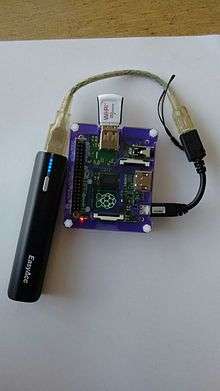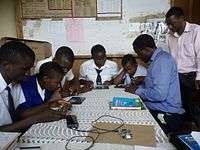World Possible

Raspberry Pi using RACHEL, powered by a battery

Students in a Tanzanian high school without electricity using RACHEL on a donated Raspberry Pi computer.[1]
World Possible is a non-profit organization that makes and distributes RACHEL (Remote Area Community Hotspot for Education and Learning), software that hosts offline free educational content such as Khan Academy, Wikipedia, Project Gutenberg and others via Wi-Fi on a Raspberry Pi computer.[2][3][4][5][6][7][8][9] RACHEL is designed so that students or schools that do not have internet connections, but may already have devices (such as cellphones) that can receive data via wi-fi, can access educational content via RACHEL as a server. Content has been tailored to meet locally-relevant demand.[10]
References
- ↑ "Raspberry Pi in Masekelo: Bringing Wikipedia to a school without electricity « Wikimedia blog". wikimedia.org.
- ↑ "The Season of Giving Back". The Huffington Post.
- ↑ "Using Agile Approaches to Improve Teaching, Learning and Education in Developing Nations". InfoQ.
- ↑ Devin Thorpe (5 November 2014). "Rotarian Hopes To Revolutionize Education In Rural Kenya With 'Rachel' and 'Raspberry Pi'". Forbes.
- ↑ "RACHEL-PI uses Raspberry Pi to bring internet to remote areas #piday # raspberrypi @Raspberry_Pi". Adafruit Industries - Makers, hackers, artists, designers and engineers!.
- ↑ "RACHEL-Pi – delivering education worldwide". raspberrypi.org.
- ↑ "Can robotics change the future of a nation?". BBC News.
- ↑ "Giving the gift of technology". CNN. 16 January 2012.
- ↑ The Christian Science Monitor. "Powering Potential puts technology in schools in Tanzania while respecting local cultures". The Christian Science Monitor.
- ↑ "RACHEL - Offline Educational Content - Khan Academy, Wikipedia, Hesperian". worldpossible.org.
External links
This article is issued from Wikipedia - version of the 11/13/2016. The text is available under the Creative Commons Attribution/Share Alike but additional terms may apply for the media files.